Are you ready to unleash the true potential of your business in the digital world?
Don’t let a tarnished online reputation hold you back! Our expert team is here to help you take control and build a rock-solid brand image that commands trust and credibility.
With our tailored strategies, we’ll craft compelling content that resonates with your target audience, engage with them on social media like never before, and optimize your online presence to dominate search engine results. You’ll see your business rise above the competition and become the go-to choice for customers.
In the digital age, managing online reputation is vital for businesses. It involves targeted strategies to build trust, credibility, and customer relationships. A clear plan, quality content, social media, SEO, reviews, and crisis management are key for maintaining a positive brand image and driving sales.
Table of Contents
- Introduction to Managing Online Reputation
- Developing a Strategy for Establishing Trust and Credibility
- Creating Quality Content to Build Your Brand
- Leveraging Social Media to Engage With Your Audience
- Responding Quickly and Effectively to Negative Feedback
- Understanding the Power of Search Engine Optimization (SEO)
- Building Partnerships with Influencers in Your Niche
- Utilizing Online Reviews and Testimonials
- Monitoring Competitor Activity For Insight
- Taking Action When Damage Control is Necessary
- Final Thoughts
Introduction to Managing Online Reputation
In the digital age, managing your online reputation is essential for any business. It is no longer enough to simply create a website and expect customers to come flocking; they must be able to trust you, and that requires building credibility. This means taking control of your online presence and creating an environment where customers feel safe engaging with you. By establishing trust and credibility through targeted strategies, businesses can ensure their reputation remains intact while also driving sales and improving customer relationships.
Developing a Strategy for Establishing Trust and Credibility
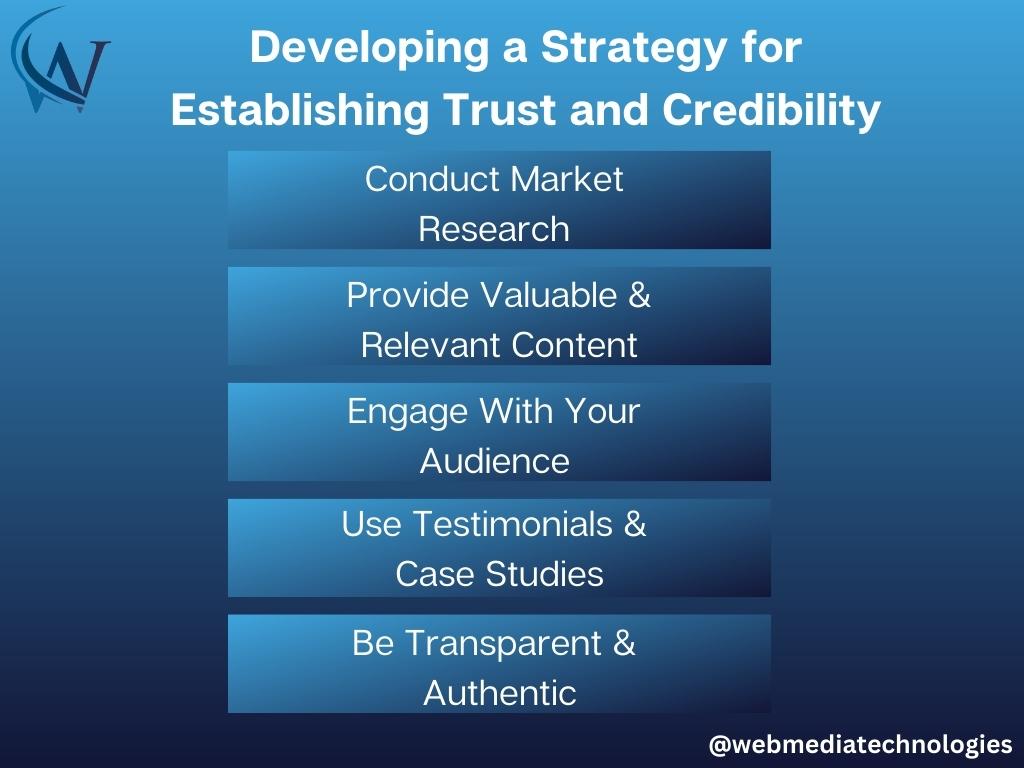
The key to developing a successful strategy for building trust and credibility online is having a clear plan of action. Creating an effective strategy should begin with understanding who your target audience is, what drives them when making purchase decisions, and how best to reach them using various digital channels.
It is also important to understand the expectations of each platform you choose so that content can be tailored accordingly (e.g., Facebook may require different content than Twitter). Additionally, developing an effective messaging strategy will help ensure that all messages are consistent across all platforms in order to maintain consistency in terms of brand voice.
- Conduct market research: Start by conducting thorough market research to understand your target audience’s needs, preferences, and pain points. This will help you tailor your messaging and content to resonate with them and build trust.
- Establish a strong online presence: Invest time and effort into building a strong online presence across various digital channels. This includes creating a professional website, active social media profiles, and engaging with your audience through blog posts, videos, podcasts, etc.
- Provide valuable and relevant content: Develop a content strategy that focuses on providing valuable and relevant information to your target audience. This could include creating educational blog posts, informative videos, how-to guides, or industry reports. By consistently delivering high-quality content, you will establish yourself as an authority in your field and build trust with your audience.
- Engage with your audience: Actively engage with your audience by responding to comments, messages, and inquiries promptly and professionally. This shows that you value their opinions, concerns, and questions, and are committed to building a relationship based on trust.
- Use testimonials and case studies: Collect and showcase testimonials and case studies from satisfied customers to demonstrate the credibility and trustworthiness of your products or services. This social proof will help potential customers feel more confident in choosing your brand.
- Collaborate with industry influencers: Partnering with influencers or industry experts who have already established trust and credibility in your niche can greatly enhance your own credibility. Their endorsement or collaboration can lend credibility to your brand and help you reach a wider audience.
- Be transparent and authentic: Transparency and authenticity are crucial in building trust. Be open about your business practices, share behind-the-scenes insights, and be honest about any limitations or challenges. This will help customers feel more connected to your brand and build trust.
- Prioritize customer service: Provide excellent customer service by promptly addressing any issues or concerns. Make it easy for customers to reach out to you, and ensure that their experience with your brand is positive and satisfying. Happy customers are more likely to trust and recommend your brand.
- Leverage social proof: Use social proof elements such as customer reviews, ratings, and social media mentions to showcase the positive experiences of your customers. This will build trust and credibility by highlighting the satisfaction of previous customers.
- Monitor and adapt: Continuously monitor and analyze the success of your trust-building strategy. Use analytics tools to track engagement, feedback, and customer sentiment. Adapt your approach based on the data to optimize your strategy and build even stronger trust and credibility online.
Creating Quality Content to Build Your Brand
Content creation is at the heart of any successful online reputation management strategy. It gives businesses the opportunity not only to build their brand but also to engage directly with their target audience on multiple levels, such as social media posts and blog articles. The key here is quality over quantity.
Focus on creating content that resonates with your target audience, rather than just pumping out large amounts which may have little effect on customer engagement or loyalty levels. Additionally, keep up-to-date with trends within your industry so that you can adjust content accordingly if needed. This will help ensure relevance both now and in the future, as market shifts occur naturally over time.
- Develop a content strategy: Start by identifying your target audience and understanding their needs and interests. Then, create a content plan that aligns with these insights and includes a variety of formats such as blog posts, infographics, videos, and social media content.
- Conduct market research: Stay up-to-date with the latest trends and industry news by conducting regular market research. This will help you identify new topics and ideas to incorporate into your content strategy, ensuring your brand stays relevant and valuable to your audience.
- Collaborate with industry influencers: Partnering with influencers in your industry can help expand your reach and credibility. Collaborate on guest blog posts, interviews, or social media takeovers to create quality content that resonates with your target audience and builds your brand authority.
- Encourage user-generated content: Engage your audience by encouraging them to create and share their own content related to your brand. This can be in the form of testimonials, reviews, or user-generated social media posts. Share and highlight this content to build trust and authenticity around your brand.
- Use storytelling techniques: Incorporate storytelling into your content to make it more engaging and relatable. Share customer success stories, behind-the-scenes glimpses into your brand, or personal anecdotes to connect with your audience on a deeper level and build emotional connections.
- Optimize for search engines: Ensure your content is easily discoverable by optimizing it for search engines. Conduct keyword research to identify relevant keywords and incorporate them naturally into your content. This will help increase your brand’s visibility and attract organic traffic to your website.
- Leverage data and analytics: Regularly analyze the performance of your content using data and analytics tools. Identify which types of content perform best, what topics resonate most with your audience, and adjust your content strategy accordingly. This data-driven approach will help you create higher-quality content that consistently delivers results.
- Engage with your audience: Actively engage with your audience by responding to comments, messages, and inquiries. This not only helps build relationships but also provides valuable insights into your audience’s preferences and interests, allowing you to create even more relevant and valuable content.
- Repurpose existing content: Make the most of your content by repurposing it into different formats. For example, turn a blog post into a video or an infographic into a social media series. This allows you to reach a wider audience and provides fresh content while leveraging your existing assets.
- Continuously improve and evolve: Regularly assess and adjust your content strategy based on feedback, analytics, and market trends. Keep experimenting with new ideas, formats, and platforms to stay ahead of the curve and ensure your content remains valuable and impactful.
Leveraging Social Media to Engage With Your Audience
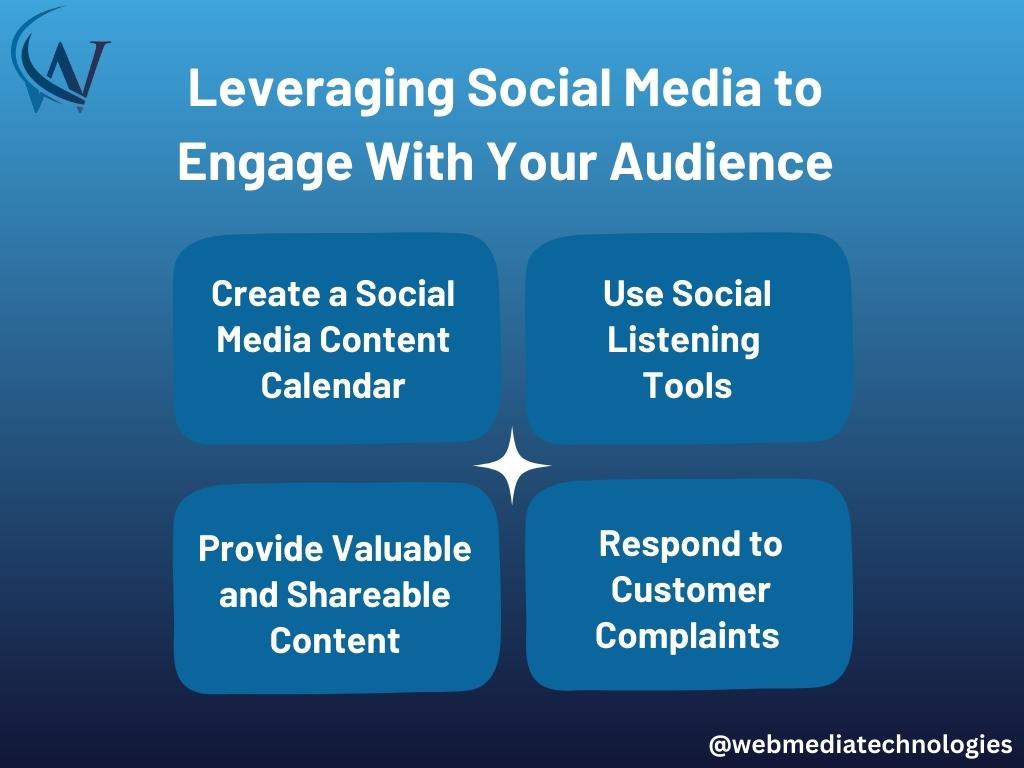
Social media is a powerful tool for managing online reputations as it allows businesses to directly engage with customers without intermediaries. Posting regularly and responding promptly to customer complaints or queries helps improve customer service and loyalty. However, companies should be cautious while responding publicly to negative comments to avoid damaging their brand image.
- Create a social media content calendar: Plan and schedule regular posts to keep your audience engaged and informed about your products, services, and company updates. This helps build brand awareness and keeps your followers interested in your content.
- Use social listening tools: Monitor social media platforms for mentions of your brand or products. This allows you to promptly respond to customer complaints or queries, showing that you value their feedback and are committed to resolving any issues they may have.
- Implement a customer feedback system: Encourage your audience to provide feedback through social media channels. This could be in the form of surveys, polls, or simply asking for their opinions. Actively listening and responding to this feedback helps improve customer satisfaction and loyalty.
- Offer exclusive promotions and discounts: Use social media platforms to announce and promote special offers or discounts exclusively for your followers. This not only encourages engagement but also helps create a sense of exclusivity and loyalty among your audience.
- Share user-generated content: Encourage your customers to share their experiences with your brand on social media by using a specific hashtag or tagging your company. Reposting or sharing user-generated content not only creates a sense of community but also serves as social proof for potential customers.
- Provide valuable and shareable content: Share informative and valuable content related to your industry or niche. This positions your brand as an expert and encourages your audience to engage with and share your content, expanding your reach and visibility.
- Engage with influencers: Collaborate with influencers or industry experts who have a large following on social media. This can help increase your brand’s visibility and credibility among their audience. Engaging with influencers could involve hosting giveaways, sponsoring content, or simply collaborating on projects.
- Respond to customer complaints privately: While it’s important to address customer complaints, negative comments should be handled privately to prevent public disputes or damage to your brand image. Promptly respond to complaints by offering a private channel of communication, such as a direct message or email, to resolve the issue.
- Encourage positive reviews and testimonials: Ask satisfied customers to leave reviews or provide testimonials on social media platforms. This helps build trust and credibility among potential customers who are researching your brand.
- Analyze social media metrics: Regularly analyze your social media metrics to understand what content resonates most with your audience. This allows you to refine your social media strategy and create more engaging content to better connect with your audience.
Responding Quickly and Effectively to Negative Feedback
Negative feedback or reviews are inevitable in business, no matter how much effort is put into preventing them. It is crucial to respond quickly and effectively to mitigate any further damage caused by these comments. Identifying potential issues before they become public knowledge is essential. Customer satisfaction surveys can help detect areas for improvement and guide staff members in handling negative feedback. Maintaining a positive and professional attitude throughout the process will help limit reputational damage and minimize the impact on the company.
- Implement a real-time monitoring system: Utilize social media monitoring tools or online review platforms to track mentions of your brand and identify negative feedback as soon as it arises. This will allow you to respond promptly and address the issue before it escalates.
- Actively listen and empathize: When responding to negative feedback, make sure to genuinely listen to the customer’s concerns and show empathy. Acknowledge their frustration or disappointment and assure them that their feedback is valued.
- Offer a sincere apology: Apologize for any inconvenience caused and take responsibility for the issue. This demonstrates accountability and shows that you are committed to resolving the problem.
- Provide a resolution: Offer a practical solution or compensation to the customer, depending on the nature of the complaint. This could include refunding their purchase, offering a replacement, or providing additional support to rectify the situation.
- Take the conversation offline: If the issue requires further discussion or sensitive information needs to be shared, encourage the customer to contact you privately via email or phone. This allows for a more personalized and confidential conversation.
- Train staff in handling negative feedback: Provide training to your customer service team on how to effectively handle negative feedback. Equip them with the necessary skills to empathize, problem-solve, and find appropriate resolutions to customer complaints.
- Regularly update your FAQs and website content: By addressing common issues or concerns in your FAQs or website content, you can proactively provide information to customers and potentially prevent negative feedback from occurring in the first place.
- Encourage positive reviews: Actively encourage satisfied customers to leave positive reviews on review platforms or social media. This helps balance out the negative feedback and showcases the company’s commitment to customer satisfaction.
- Monitor trends and patterns in feedback: Analyze the negative feedback received to identify any recurring issues or patterns. Use this data to make necessary improvements in your products, services, or internal processes, addressing the root cause of the complaints.
- Follow up with customers: After resolving the issue, follow up with the customer to ensure their satisfaction. This gesture shows that you value their experience and are committed to maintaining a positive relationship.
- Learn from the feedback: Rather than viewing negative feedback as a setback, use it as an opportunity for growth and improvement. Analyze the feedback, identify areas for development, and implement necessary changes to prevent similar issues in the future.
Understanding the Power of Search Engine Optimization (SEO)
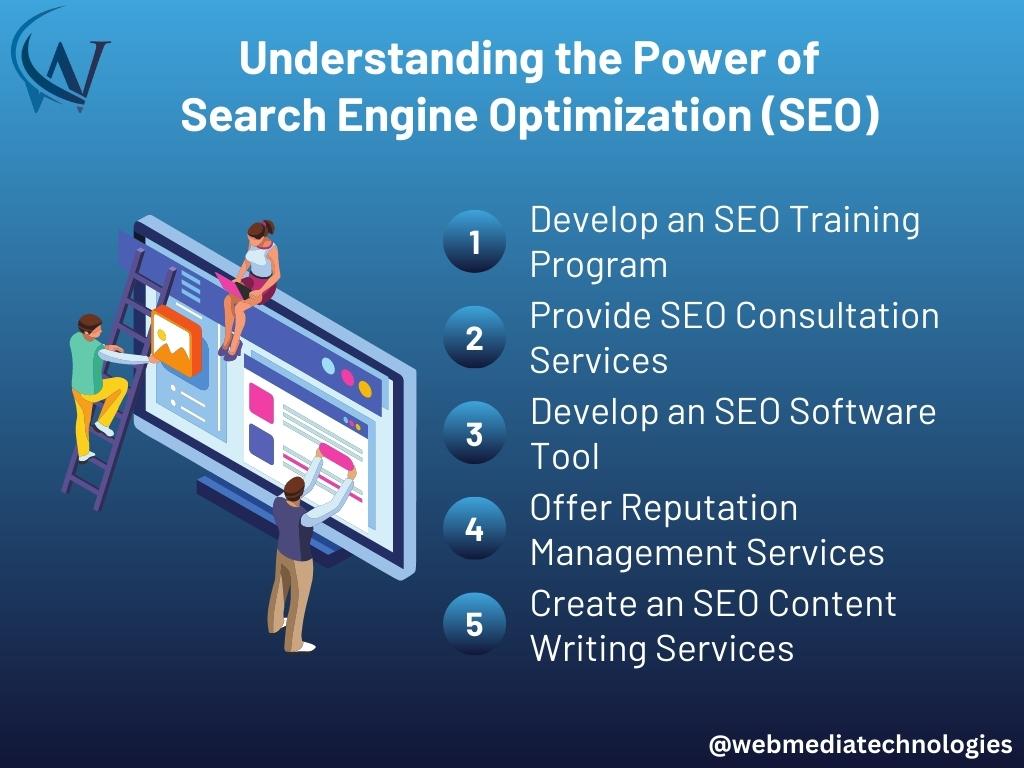
Search engine optimization (SEO) plays a huge role when it comes to managing digital reputations, allowing companies to increase visibility among target audiences while simultaneously pushing down visibility results containing negative press by utilizing specific keywords and phrases associated with positive reviews, brands, products, etc.
Increasing the prominence of these types of results appears naturally through natural organic searches, as opposed to traditional paid advertising campaigns which often lack longevity due to the cost-prohibitive nature of ongoing campaigns. Constantly running and continuously updating SEO campaigns ensures that always relevant and up-to-date information is presented to searchers.
- Develop an SEO training program: Create a comprehensive training program to educate businesses and individuals on the power of SEO and how to effectively implement it. This could include workshops, online courses, and resources to help companies understand the importance of SEO in managing their digital reputations.
- Provide SEO consultation services: Offer consulting services to businesses and individuals who want to improve their online visibility and reputation. This could involve analyzing their current SEO strategies, providing recommendations, and helping them implement the necessary changes to optimize their search engine rankings.
- Develop an SEO software tool: Create a user-friendly software tool that helps businesses track their SEO performance and make necessary adjustments. This tool could provide insights on keyword rankings, backlink analysis, and competitor analysis, ultimately helping businesses stay on top of their SEO campaigns.
- Offer reputation management services: Combine SEO with reputation management strategies to provide comprehensive solutions for individuals or companies looking to improve their online image. This could involve monitoring and addressing negative press, managing online reviews, and implementing SEO techniques to push down negative search results.
- Create an SEO content writing service: Develop a team of skilled content writers who specialize in creating SEO-optimized content. Offer this service to businesses who need help creating engaging and keyword-rich content that can boost their search engine rankings and online visibility.
- Host SEO workshops and webinars: Organize educational workshops or webinars to educate businesses, marketing professionals, and individuals about the power of SEO. These events could cover various topics such as SEO best practices, keyword research, content optimization, and link-building strategies.
- Collaborate with digital marketing agencies: Partner with digital marketing agencies to incorporate SEO services into their existing offerings. By working together, businesses can leverage the expertise of both parties to create comprehensive and effective digital marketing campaigns.
- Develop an SEO certification program: Create a certification program that validates individuals’ knowledge and skills in SEO. This could be beneficial for aspiring SEO professionals looking to enhance their credentials and for businesses seeking qualified SEO experts.
- Offer SEO audits: Provide comprehensive SEO audits to businesses to evaluate their current SEO strategies and identify areas for improvement. This service could include analyzing website structure, keyword usage, backlink profiles, and overall optimization techniques.
- Develop industry-specific SEO strategies: Create tailored SEO strategies for specific industries or niches. By understanding the unique needs and challenges of different sectors, businesses can benefit from highly targeted SEO campaigns that improve visibility and reputation within their specific market segments.
Building Partnerships With Influencers In Your Niche
Building partnerships with influencers within your chosen niche area is another great way to build trust and credibility among consumers associated with the services or products offered by your company, especially those who consider themselves ‘early adopters’ or trendsetters in the industry. Having an influencer actively promoting your brand endorses a level of authenticity and legitimacy, ultimately leading to increased conversions and sales due to the fact that followers tend to view influencer recommendations in higher regard compared to other forms of traditional advertisements.
- Collaborate on Sponsored Content: Work with influencers to create sponsored content that showcases your products or services. This can include blog posts, social media posts, or videos. By partnering with influencers who have a strong following in your niche, you can reach a wider audience and gain credibility.
- Offer Exclusive Discount Codes: Provide influencers with exclusive discount codes to share with their followers. This not only incentivizes their audience to try your products but also tracks the success of the partnership. Influencers can also use these codes as a way to promote their own brand and gain more followers.
- Host Giveaways or Contests: Partner with influencers to host giveaways or contests on their platforms. This can help increase engagement and brand awareness. You can ask the influencer to promote the giveaway to their audience, and in return, they can gain exposure and potentially new followers.
- Feature Influencers in Your Content: Showcasing influencers on your website or social media platforms can help build credibility. You can interview them, feature their success stories, or collaborate on content creation. This not only strengthens the partnership but also gives your audience a chance to learn from industry experts.
- Attend Industry Events Together: Attend industry events or conferences with influencers in your niche. This provides an opportunity to network, build relationships, and showcase your brand. By being seen with influencers, you can establish yourself as a trusted and respected company within the industry.
- Share Influencer Testimonials: Ask influencers to provide testimonials about your products or services. These testimonials can be displayed on your website or in your marketing materials. By leveraging the influence and credibility of these individuals, you can further enhance your brand’s reputation.
- Collaborate on Co-Created Products or Services: Partner with influencers to co-create a product or service that aligns with your brand and their expertise. This not only allows you to tap into their knowledge but also ensures that the final product resonates with their audience. Co-creation can lead to increased sales and brand loyalty.
- Offer Affiliate Partnerships: Set up affiliate partnerships with influencers in your niche. This means they earn a commission for every sale generated through their unique affiliate link. This incentivizes them to actively promote your products or services and can lead to a mutually beneficial long-term partnership.
- Organize Influencer Events or Meetups: Plan and host events specifically for influencers in your niche. This can be a networking event, a product launch party, or an educational workshop. By creating opportunities for influencers to connect and engage with your brand, you can foster stronger partnerships and increase brand visibility.
- Seek Influencer Input: Involve influencers in your product development or marketing strategy. Their insights and feedback can help shape your offerings to better meet the needs and preferences of your target audience. By showing that you value their expertise, you can strengthen your partnership and build trust among their followers.
Utilizing Online Reviews and Testimonials
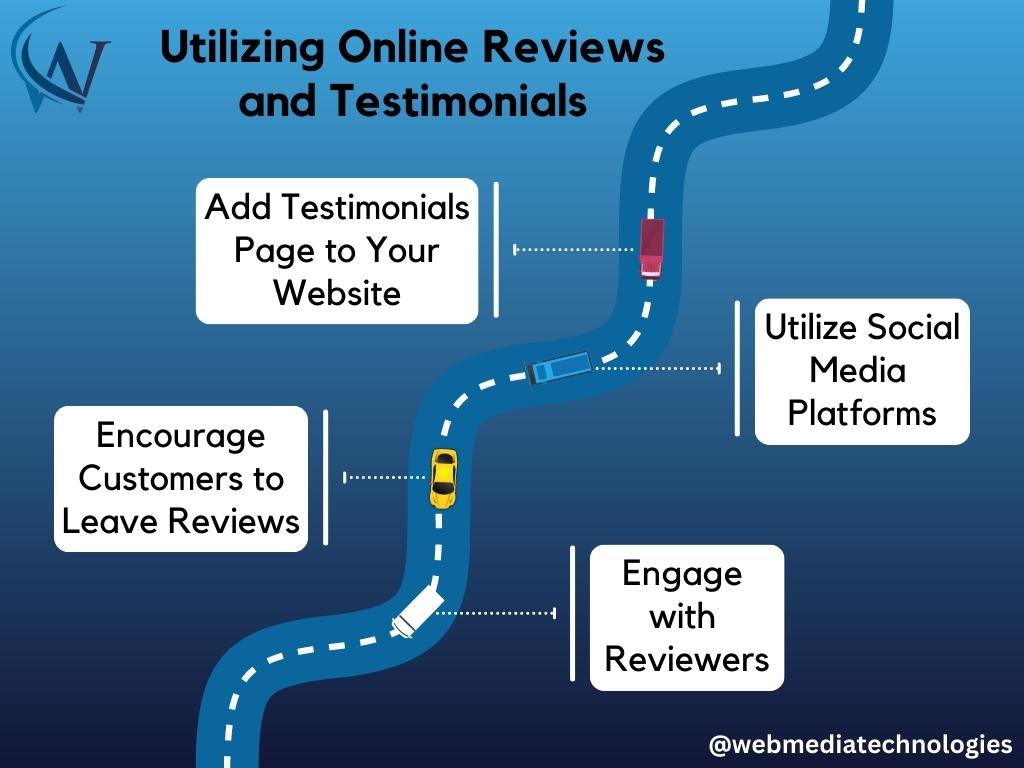
Utilizing reviews and testimonials from satisfied customers goes a long way towards helping establish a reputation of good standing among consumers, particularly those who are prone to researching a particular product or service prior to making a purchasing decision. Many people find comfort in seeing the opinions of others who have already experienced goods or services firsthand, allowing them to make informed decisions based upon the collective experiences of others. This is something that companies cannot replicate themselves, thus why utilizing reviews is extremely beneficial to the overall success rate of relations between a business and its consumer base.
- Create a dedicated testimonials page on your website: Build a webpage specifically for showcasing customer reviews and testimonials. This will provide potential customers with easy access to real-life experiences and positive feedback from satisfied customers, boosting their confidence in your products or services.
- Encourage customers to leave reviews: Implement a system that encourages customers to leave reviews after making a purchase or using your service. Offer incentives such as discounts, exclusive content, or loyalty points to motivate them to share their experiences.
- Utilize social media platforms: Share positive reviews and testimonials on your social media channels. This will not only showcase your satisfied customers but also increase your brand’s visibility and reach a wider audience.
- Engage with reviewers: Respond to online reviews, whether positive or negative, to show that you value customer feedback. This demonstrates your commitment to customer satisfaction and helps build trust with potential customers who are researching your brand.
- Incorporate reviews in advertising campaigns: Utilize excerpts from positive reviews in your advertising efforts. This can include adding snippets to your print ads, showcasing customer testimonials in TV commercials, or incorporating positive feedback in your online banners or email marketing campaigns.
- Collaborate with influencers: Partner with influencers or industry experts who align with your brand. Allow them to review your products or services and share their experiences with their audience. This can significantly increase your brand’s exposure and credibility.
- Monitor and respond to online reviews: Regularly monitor various review platforms (such as Google, Yelp, or Trustpilot) to stay updated on customer feedback. Promptly respond to both positive and negative reviews to address any concerns and show your dedication to customer satisfaction.
- Create video testimonials: Video testimonials have a strong impact on potential customers. Encourage satisfied customers to record short videos explaining their positive experiences with your brand. These videos can be shared on your website, social media channels, or even incorporated into TV commercials.
- Feature reviews in email newsletters: Include snippets of positive reviews in your email newsletters to keep your subscribers engaged and informed about the positive experiences of other customers.
- Leverage reviews for product/service improvements: Analyze customer reviews to identify areas of improvement in your products or services. Use this feedback to enhance your offerings and demonstrate to customers that their opinions are valued.
Remember, authenticity is key when utilizing online reviews and testimonials. Avoid fake or manipulated reviews, as they can harm your reputation in the long run. Focus on building a strong relationship with your customers and providing excellent experiences that naturally generate positive feedback.
Monitoring Competitor Activity For Insight
Monitoring competitor activity is yet another invaluable tool that helps gain insights into the best practices used in the current market conditions and measure performance success rates. For anyone looking to maximize returns on investments, monitoring the activities of competitors allows for the development of strategies to emulate successes and avoid pitfalls or poor-performing techniques.
For instance, one could look to see the methods utilized in generating repeat purchases and a loyal following, then implement similar strategies in their own operations, gaining an edge over the competition. This can be a lucrative endeavor despite limitations in resources, budget, or scale availability.
- Create a comprehensive competitor analysis report: Develop a system to regularly gather data on competitors’ marketing strategies, pricing, product offerings, customer reviews, and customer engagement on social media platforms. This report can serve as a valuable resource for identifying trends and areas for improvement in your own business.
- Conduct customer surveys: Reach out to your customers to gather feedback on their experience with your competitors. Ask questions about what they like and dislike about their products or services, and use this information to refine your own offerings.
- Monitor competitor advertising campaigns: Keep a close eye on your competitors’ advertising efforts, including online ads, TV commercials, and social media campaigns. Analyze the messaging, visuals, and target audience to gain insights into successful marketing tactics and adjust your own campaigns accordingly.
- Track competitor pricing strategies: Regularly monitor your competitors’ pricing strategies to ensure that your products or services remain competitive in the market. Adjust your pricing strategy based on the value provided by your competitors and the perceived value by your target audience.
- Stay up to date with industry news and trends: Keep tabs on industry publications, forums, and social media groups to stay informed about the latest trends and innovations in your industry. By doing so, you can identify new opportunities and adjust your business strategy accordingly.
- Attend industry conferences and events: Participate in industry conferences and events where your competitors are likely to be present. This will give you the opportunity to network with industry leaders and gain insights into their strategies and best practices.
- Monitor competitor’s website and online presence: Regularly visit your competitors’ websites, subscribe to their newsletters, and follow their social media accounts. This will help you stay updated on their latest offerings, promotions, and customer engagement strategies.
- Take note of customer feedback and reviews: Pay attention to online reviews and customer feedback about your competitors. Identify common pain points or areas where they excel. Use this information to improve your own products or services and differentiate yourself in the market.
- Analyze competitor partnerships and collaborations: Keep track of your competitors’ partnerships and collaborations with other businesses. This can provide insights into potential opportunities for your own business to form strategic alliances and expand your reach.
- Engage with industry influencers: Identify key influencers in your industry who have a significant following and engage with them. By monitoring how your competitors interact with influencers, you can gain insights into effective influencer marketing strategies and leverage these relationships for your own benefit.
Taking Action When Damage Control Is Necessary
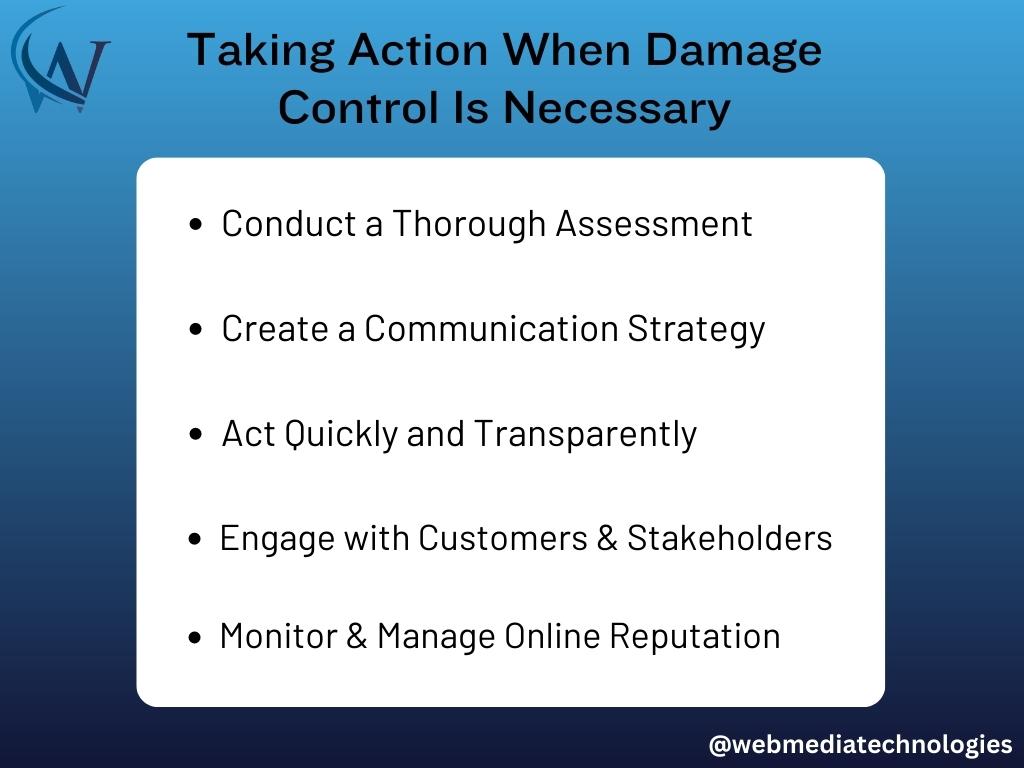
Despite making the best efforts to take preventative measures to protect against reputational damage, sometimes actions outside of our control occur, resulting in damaging effects suffered by a company’s brand image. In these situations, the prompt need for taking action to rectify the situation quickly and efficiently is crucial in restoring lost faith among existing clientele.
To do this, implementing a comprehensive crisis management protocol is crucial, proving to be an invaluable resource in helping deal with complications that arise during times of distress. Understanding the purpose of each step in the resolution process is a critical part of the entire process and must be taken into account during the planning stages to minimize the severity of the negative effects experienced.
- Conduct a thorough assessment: Identify the source and extent of the damage, understand the potential impact on the brand image, and assess the current sentiment among existing clientele.
- Designate a crisis management team: Form a team with representatives from PR, legal, marketing, and senior management to develop an effective action plan.
- Develop a clear communication strategy: Outline key messages, communication channels, and a timeline for delivering updates to stakeholders.
- Act quickly and transparently: Take immediate action, be transparent in communication, and provide regular updates to demonstrate commitment to resolving the situation.
- Offer appropriate compensation or solution: Provide refunds, discounts, replacements, or other restitution tailored to the situation and affected clients.
- Engage with customers and stakeholders: Actively listen, address concerns, and provide personalized responses to rebuild trust and restore faith.
- Monitor and manage online reputation: Monitor social media, review sites, and online channels to promptly address negative feedback and correct inaccuracies.
- Learn from the experience: Evaluate the crisis management protocol’s effectiveness, identify areas for improvement, and update the plan accordingly.
- Rebuild relationships and loyalty: Implement loyalty programs, personalized offers, and excellent customer service to regain trust and loyalty.
- Proactively communicate preventive measures: Share the company’s preventive measures to avoid similar incidents, demonstrating a commitment to preventing future issues.
Final Thoughts
Managing online reputation is crucial for businesses in the digital age. By establishing trust and credibility through targeted strategies, businesses can ensure their reputation remains intact while also driving sales and improving customer relationships. Developing a clear plan of action, creating quality content, leveraging social media, responding quickly and effectively to negative feedback, utilizing search engine optimization, building partnerships with influencers, utilizing online reviews and testimonials, and monitoring competitor activity are all key components of a successful online reputation management strategy.
Additionally, having a comprehensive crisis management protocol in place is important for taking action when damage control is necessary. By implementing these strategies, businesses can effectively manage their online reputation and maintain a positive brand image.
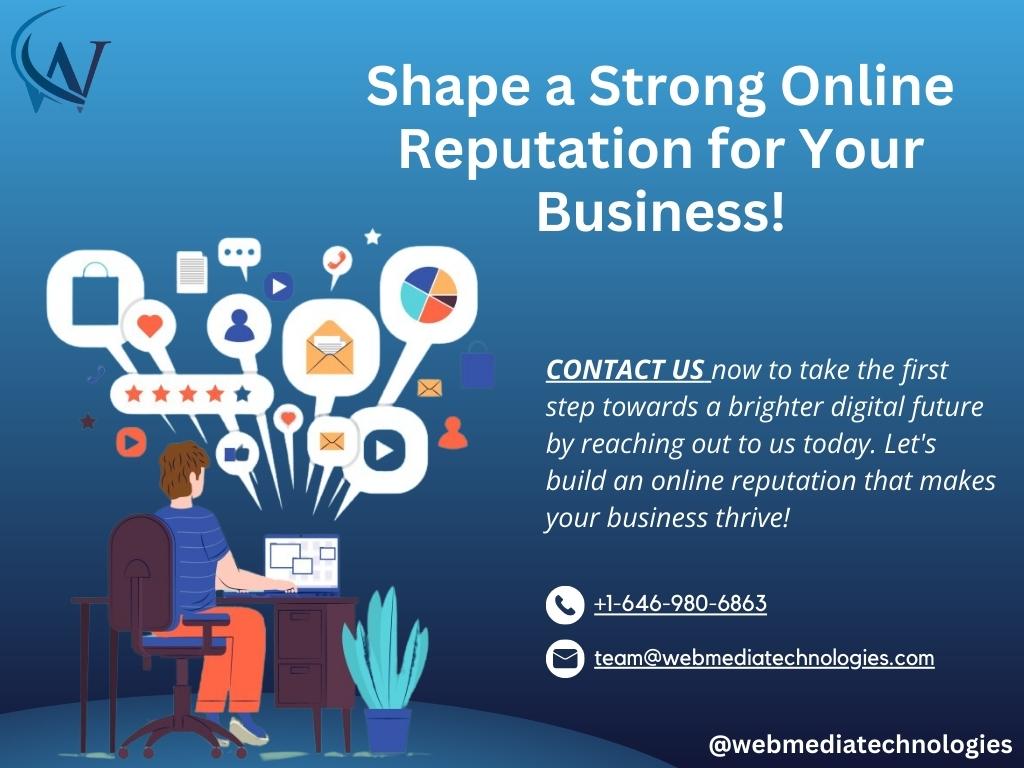
Don’t miss out on the chance to elevate your business and leave a lasting impression on customers and industry influencers alike.
Take the first step towards a brighter digital future by reaching out to us today. Let’s build an online reputation that makes your business thrive – contact us now!

